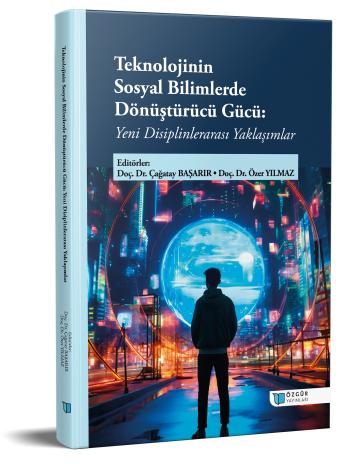
The Transformative Power of Technology in Social Sciences: New Interdisciplinary Approaches
Synopsis
This book aims to bring together theoretical and applied studies designed to explain the transformative impact of technology on social sciences and to introduce researchers and readers who want to work on the subject to innovations in the field.
The book contains eleven chapters covering current developments in different fields of social sciences. The first chapter deals with the subject of Machine Learning, which offers an important opportunity to improve the understanding and prediction of social behavior, by Dr. Ömer Faruk Seymen. The second chapter presents analyses of water and greenhouse gases in Morocco and Turkey's climate adaptation process using data mining by Oussama Hakki and Assoc. Prof. Dr. Nur Kuban Torun. The third chapter includes a bibliometric analysis of artificial intelligence studies in the banking sector using the R programming language by Dr. Fatma Zeybek and Dr. Itır Hasırcı.
In the fourth chapter of our book, Müge Özaydın presents her findings on how technological innovations have changed the behavior of consumers in the Turkish banking sector. In the fifth chapter, Assoc. Prof. Müjde Aksoy and Assoc. Prof. Özer Yılmaz explain the concept of Avatar Marketing and make evaluations on the use of this concept in the marketing field. In the sixth chapter of the book, Assoc. Prof. İbrahim Murat BİCİL touches on the problems created by incomplete competition in digital markets and presents an evaluation on regulatory measures. In the seventh chapter of the book, Dr. Onur Özaydın addresses the conceptual impact of technological developments and innovations experienced worldwide on unemployment and evaluates whether they have created a theoretical and definitional change on unemployment.
In the eighth chapter prepared by Dr. Burçin Boz and Assoc. Prof. Dr. Hakan Boz, the concept of technology-based tourism is discussed and how these activities create advantages, especially in terms of businesses and tourist experiences, is examined. In the ninth chapter, Dr. Volkan Akgül presents examples of the use of technology in the food and beverage sector and touches on the importance of these applications in creating customer satisfaction and competitive advantage. In the tenth chapter of the book, Assoc. Prof. Dr. Oğuz Diker examines the use of digitalization and digital marketing applications in museums in the light of examples. In the last chapter of our book, Assoc. Prof. Dr. Cemalettin Hatipoğlu discusses the electronic human resources management approach and the advantages this approach will provide for businesses.
We believe that this book will be a valuable resource for academics, researchers, students, practitioners and anyone interested in the subject, and will make significant contributions to the field.

